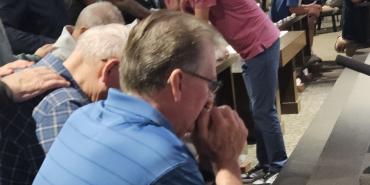Palm Sunday Perspectives

No two people witness events in the same light. Ask any police officer about accident reports—five witnesses will tell five different versions of the same event. The five groups of Palm Sunday witnesses 2,000 years ago had different perceptions when Jesus entered Jerusalem on a donkey. The whole city asked: "Who is this man?" Each group had its own answer to the question (Matthew 21:10).
First to report were the disciples. In their eyes, finally a long-awaited day had arrived, a day of victory. Jesus would actually take his rightful place as the Son of God, the Messiah, the Deliverer. Maybe the disciples didn't understand all that Jesus taught, but they did realize Jesus was finally allowing himself to be called King.
Now they would show all those scoffers.
Now they would take their rightful places in the new kingdom's cabinet.
Now they would have power and authority.
Now their friends would look up to them and envy them.
It was about time.
First, Judas Iscariot, the treasurer of the disciples, was probably overcome with happiness. He'd never quite believed that Jesus was being straight when He talked about His kingdom not being of this world. To be head of the treasury department was possibly Judas' dream come true. He'd be rich!
Second, we see the response of the pilgrims when they spied Jesus' entrance to Jerusalem: Ecstatic. Hopeful. Optimistic. They thought Jesus would set up an earthly kingdom and free them from Roman bondage. They were confident of His victory. After all, they had seen His miracles. Anyone who could raise Lazarus from the dead could surely liberate them from Rome.
The spectators cast their coats and laid palm branches on the road for the donkeys to walk on, a spontaneous red carpet of sorts. Palm branches were an important part of this homage, for they had become a nationalistic symbol since the rededication of the temple in 164 B.C. At last, deliverance from Roman oppression seemed possible. As they followed Jesus into the temple, the crowds shouted, "Hosanna to the Son of David! Blessed is he who comes in the name of the Lord! Hosanna in the highest!" (Matthew 21:9)
However, when everyone reached the temple, Jesus began turning over the moneychangers' tables and knocking over the benches of those selling doves. Howls of protest overshadowed the shouts of praise. Jesus? Causing a disturbance? "Has he gone crazy?" the crowds asked. "Quick! Let's go before the riot police arrive!"
In a few minutes the crowd disappeared, except for some people Jesus healed, while children sang, "Hosanna to the Son of David," in the temple area (Matthew 21:15).
Third, we have the reaction of those indignant chief priests and the teachers of the law. After witnessing the debacle around the moneychangers, they watched Jesus heal the sick. Their anger grew with every miracle. The children calling him the "Son of David" made matters worse. The religious leaders complained, "Do you hear what these children are saying?" (Matthew 21:16).
"Yes, I heard them," Jesus said. Then He condoned the children's words by quoting Psalm 8:2, "From the lips of children and infants you have ordained praise."
Though surrounded by those who could suddenly walk and see, the priests and teachers of the law remained blind to the reality of God's Son in their midst.
Fourth, we have Jesus' view. He knew all along that Palm Sunday wouldn't be a day of victory from Roman oppression. He knew He would be betrayed by one of His own. He knew these same crowds would soon cry, "Crucify him! Crucify him!" He knew He was headed for the cross.
But the day hosted more than defeat, for Jesus would be victorious over pride and worldly ambition.
Meekness and gentleness would win over rage and malice. Obedience would reign over selfishness. Victory over sin would follow.
Lastly, we have the soldiers on crowd control duty: "What a sham! What a sorry sight. A king arriving on a donkey? Who are they kidding? Our Roman Caesars have majestic gates built in their names and enter conquered cities on gilded carriages with elaborate ceremonies. This is a joke."
Later, at the foot of the cross, some of those same soldiers murmured, "Surely he was the Son of God" (Matthew 27:54).
Five sets of witnesses that Palm Sunday so long ago. Five different versions of the facts. Yet the true meaning of the story remains: On Palm Sunday Jesus started a chain of events that would culminate on Easter Sunday—events that enable us today to proclaim, as did His followers, "Hosanna! Blessed is he who comes in the name of the Lord! Hosanna in the highest!"
Pat Stockett Johnston is a freelance writer and speaker who served for 20 years as a missionary in the Middle East.
Holiness Today
Please note: All facts, figures, and titles were accurate to the best of our knowledge at the time of original publication but may have since changed.




